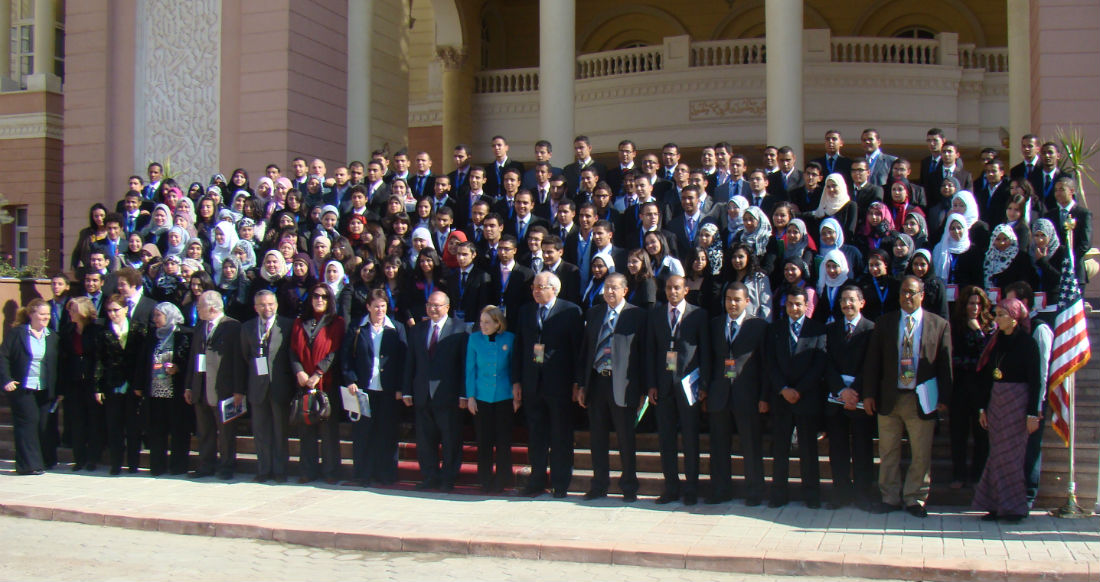

USAID LOTUS Scholarship Program
The USAID/Egypt Leadership Opportunities Transforming University Students (LOTUS) Scholarship Program was a ten-year cooperative agreement funded by the United States Agency for International Development (USAID) and implemented by the Institute of International Education. The LOTUS Program was designed to competitively award scholarships to financially disadvantaged Egyptian students to obtain undergraduate degrees from private universities in Egypt in fields of study that are important to the country’s current and future development.
The scholarship initiative was based on the development hypothesis that increased scholarship opportunities for targeted youth will contribute to a better-educated workforce that responds to Egypt’s labor market needs. Outreach and recruitment were conducted nationwide to identify students who not only excelled academically, but also had community service and leadership experience or potential, and to achieve geographic and gender-diversity.
- A total of 250 students were awarded comprehensive scholarship packages between 2011 and 2014 for three to six years of study.
- 74% of graduates gained employment within one year of graduation.
- 134 students completed a semester or summer term at a U.S. university.
- 388 internships were completed by students.
- 65 student service-learning projects were implemented across 15 governorates.
- 8 workshops and conferences were conducted by students.
- 4,000+ Leadership and Enrichment Sessions were held by IIE and partners.
Through academic degrees, leadership enrichment programs, career development opportunities, and community-based service learning, students were supported throughout the period of their scholarships to help them gain practical experience and leadership skills.
The LOTUS Program recruited students with potential to develop leadership skills and to take part in service opportunities, complementing their host institution’s academic and extracurricular offerings through the Leadership in Action program. This program helped students focus on life skills for academic success and leadership effectiveness; leadership, self-discovery, and service; student-led, team-based leadership learning projects; and career-based activities that promote commitment to local communities and engagement in social entrepreneurial activities in their home governorates.. The program covered personal growth and development, leadership concepts and fundamentals, leaderships skills development, and service learning and community interaction opportunities.
LOTUS provided a comprehensive program of academic and non-academic activities to maximize the likelihood that LOTUS students would be able to apply the knowledge and skills that they have gained to address Egypt’s development challenges. The program offered each student the following career development support services: career assessments, individual career counseling sessions, internships, thematic workshops, exposure to local leaders and HR personnel, career mentoring, career guidance, and support to obtain job interviews in their last year of academic study.
LOTUS students were presented with opportunities to study in the United States, which consisted of studies or a combination of study and internship opportunities ranging in duration from two-month summer programs to four-month academic terms. IIE had established collaborative partnerships with US universities that were eager to have foreign undergraduate non-degree students on their campuses.
The LOTUS Program provided Cohort 3 and 4 students with a Bridge Year English Language and Academic Preparation Program specifically tailored and implemented by the British University in Egypt to provide a suite of essential skills that are considered to be a basic entry requirement for any higher education institution.
Contact us to learn more about IIE’s experience implementing LOTUS and other USAID-funded programs.
SPonsor
This program was sponsored by the United States Agency for International Development (USAID). This program page was made possible by the generous support of the American people through USAID. The contents are the responsibility of the Institute of International Education and do not necessarily reflect the views of USAID or the United States Government.